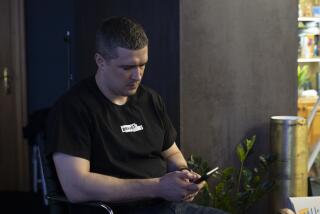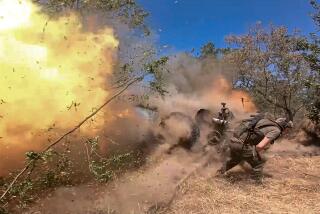Ukraine blocks popular Russian-owned social media sites, saying it’s a matter of national security
Reporting from Moscow — Ukraine’s new blocking of popular, Russian-owned social media sites has been met with opposition by human rights groups who consider the move to restrict access to information more in line with authoritarianism than democracy.
Kenneth Roth, executive director of Human Rights Watch, compared the ban ordered this week by Ukrainian President Petro Poroshenko to censorship by the government of Russian President Vladimir Putin.
“When will Ukraine learn that emulating Russia’s repression is no way to distinguish itself from Russia,” Roth said on Twitter.
Sergei Leshchenko, a former investigative journalist who was elected to Ukraine’s parliament in 2014, posted on his Facebook page that the new ban had “much more in common with authoritarian regimes than with the struggle against Russian propaganda.”
Poroshenko this week ordered Ukrainian Internet providers to block Vkontakte and Odnoclassniki. The sites are similar to Facebook and are two of the most popular social networking sites in the former Soviet space.
More than 25 million Ukrainians, in a country of about 43 million people, use the Russian sites to connect with friends, join groups and use the online messaging systems.
Poroshenko said the new restrictions were necessary to further protect Ukraine from Kremlin hybrid warfare, including disinformation campaigns, propaganda and military attacks. The two neighbors and former Soviet republics have been embroiled in a brutal, three-year war that has killed more than 10,000 people and displaced about 1.7 million eastern Ukrainians.
Supporters of the ban said it would also protect Ukrainians from the Russian security services’ ability to monitor and gather metadata from the sites’ users. Ukrainian government officials said the sites are closely monitored by Russia’s FSB, the successor agency to the KGB.
Putin spokesman, Dmitry Peskov, said the ban was “another manifestation of an unfriendly and short-sighted policy of Kiev towards Russia.” He added that the Kremlin had not ruled out the idea of reciprocity.
Poroshenko, who had accounts on both social networking sites until May 16, defended the ban in a statement on his Vkontakte page. He and his team had joined the Russian social networks as a tool to counter Kremlin propaganda, but in the aftermath of the recent global cyberattacks around the world, which he linked to the Kremlin, Poroshenko said it was time for Ukraine to “act differently and more decisively” against Russia’s propaganda.
“Hybrid warfare demands adequate responses to challenges,” the Ukrainian president wrote before closing his account.
The latest ban includes anti-virus companies Kaspersky Labs and DrWeb, both Russian owned, as well as the popular Russian search engine Yandex. Email accounts with Mail.ru, the parent company of Vkontakte and Odnoclassniki, will also be blocked.
Ukraine first banned Russian media in 2014, when it placed sanctions on Russian businesses and individuals in retaliation for Russia’s annexation of Crimea and its support for the separatist forces in eastern Ukraine.
In the lead-up to the annexation of Crimea and the war with Russian-backed eastern separatist forces in eastern Ukraine, Russian state media helped whip up anti-Ukrainian sentiment via news stories targeting Russian-speaking audiences to portray the anti-government protests in Kiev as a Western-orchestrated, fascist coup.
Russian social media sites have played a big role in both mobilizing separatist, pro-Russia sentiment in the Ukraine’s eastern regions and in disseminating anti-Ukrainian hate speech, said Eugen Fedchenko, the director of the journalism school at the National University of Kyiv-Mohyla Academy in Kiev.
Fedchenko is a founder of a media fact-checking organization called StopFake, which works to dispel fake news stories and disinformation campaigns.
“I can’t imagine seeing a group calling for the killing of Ukrainians on Facebook, but that is very common on Vkontakte,” Fedchenko said. “Sure, these groups could try and mobilize again using Facebook. But Facebook has stricter guidelines and protocols for stopping hate speech. These Russian sites don’t.”
Other supporters of the ban said the government should have implemented the blockage of Vkontakte and Odnoclassniki three years ago, at the onset of the war.
“To be honest, it’s surprising to me that the Ukrainian society is not more accepting of this policy,” said Sergei Solodkyy, an analyst at the Institute of World Policy, a think tank in Kiev. “We have to keep in mind that Ukraine is at a stance of war with Russia. Of course, it’s a delicate balance with the freedom of information, but for Ukraine, security and defense comes first.”
Twitter: @sabraayres
Ayres is a special correspondent.
More to Read
Sign up for Essential California
The most important California stories and recommendations in your inbox every morning.
You may occasionally receive promotional content from the Los Angeles Times.











